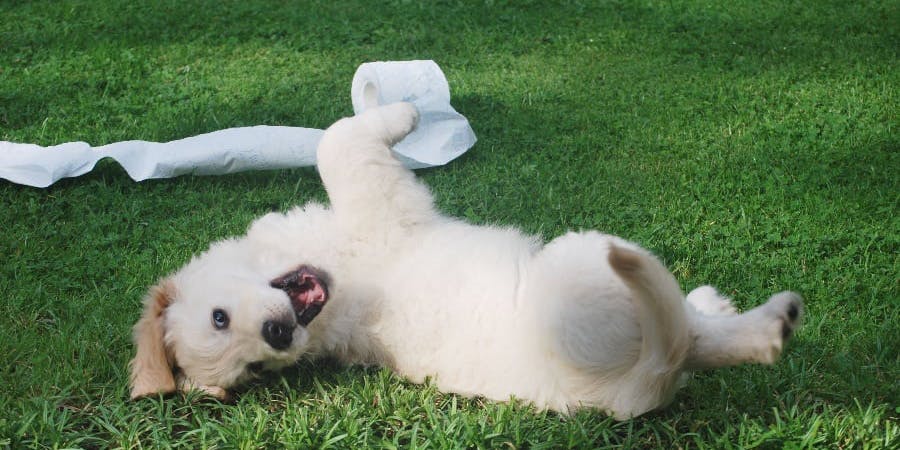
Puppy parenting: training your puppy to be home alone
Care
General Advice
Dog
09/05/2023
As much as we want to spend every waking moment with our furry friends, most pet parents work either full or part-time. There’ll be periods where your puppy needs to be left alone at home while you’re at work. But how long can you leave them alone at home before it might become an issue?
This can be tricky in the early stages of your puppy’s life. The general rule is that you can only leave a puppy alone for one hour for each month of their age due to their bladder control (a 3 month old puppy could hold their bladder for 3 hours, etc).
With the right routine, preparation and potty schedules however, you will be able to develop a system that works for both you and your puppy.
What is separation anxiety in puppies?
Separation anxiety is extremely common in both dogs and puppies and occurs when a dog becomes distressed or upset whenever its owner leaves. It is one of the biggest causes of behavioural problems in dogs, and may present itself in a number of ways from whining, scratching at the door, excessive barking or destructive behaviour. Although it is natural for dogs to want to be close to their owners at all times, steps should be put in place while your puppy is young to avoid separation anxiety issues and get your pup used to spending time alone gradually.
Signs of separation anxiety
- Barking or howling
- Chewing, digging and any form of property destruction
- Having accidents inside (even when they are house trained)
- Pacing
- Excessive drooling or panting
- Trying to escape your property
Tips for preventing separation anxiety in your puppy
There are some simple things that you can do to train your new puppy to be comfortable spending time alone.
- Crate train your dog - start by introducing your puppy to its crate for short periods of time while you are present slowly increasing how long your pet spends in its crate so they become used to it and start to view it as a safe place.
- If you work full time it is good if you can go home and visit your puppy on your lunch break or if this is not possible you can organise a friend or dog walker to visit your pup during the day.
- Don't encourage overly clingy behaviour with your puppy! Instead set your puppy up for being independent by building a strong stay command and getting them used to staying for 5 minutes with you in sight, but slowly build up the time and eventually teach them to stay while you are out of sight.
- Make leaving and arriving home uneventful for your puppy, it is important to never make a big deal of saying goodbye to your pet before you leave the house, always do you best to stay calm as you don't want your pet to get all worked up.
- Practice spending time in separate rooms in the house from your pup, initially only leaving for a few minutes at a time, and gradually increasing the time. When training your pet is spend time alone it is always important to reward calm and quiet behaviour.
- Exercise! Although exercise cannot cure separation anxiety it can help to treat or prevent it. So it is important to ensure your puppy gets the right amount of exercise and stimulation, as a tired content puppy is a lot more likely to settle down when you leave for the day.
Although it can be hard to know how long is too long to leave a puppy at home, as a general rule of thumb the length of time will depend on their age. Below we will cover more about the a look at the level of supervision you’ll need to consider at different stages of puppy’s life.
8-10 weeks:
Bladder control level: Will be able to hold it for 2-3 hours
Your puppy is still new to the home and therefore more prone to stress if left alone.
As he is still potty training at this stage, he will need to be taken to his toilet area frequently.
We recommend that you bring puppy to work (if possible), arrange for a friend or family member to be home with him, or for someone else to look after him while you are at work.
10-12 weeks:
Bladder control level: Will be able to hold it for 3-4 hours
Your puppy’s bladder control may have improved by this stage, but they are still likely to be prone to accidents and will not be able to hold longer than a few hours.
We recommend you visit your puppy during your lunch break to let him out, or arrange for someone to drop by and let him out a couple of times a day.
3-6 months:
Bladder control level: Will be able to hold it for 3-6 hours
Your puppy should by now, be able to last for 3-4 hours without going to the toilet, however may still be prone to accidents.
We recommend you continue to drop by during your lunch break, or have somebody visit once a day to let the puppy out.
Apart from bladder control, you may encounter a few other issues with leaving your puppy alone at home. They may experience separation anxiety, boredom/destructive behaviour such as chewing and digging or bark incessantly.
Separation anxiety in puppies and dogs isn’t always preventable, despite your best efforts. And once t has developed in a dog it can be a hard thing to fix. It’s important that you address these issues before they become ingrained in your puppy as they grow up. Keep training them consistently or take them to a specialist/dog sitter if the problems persist. If needed you can always call on the help of a experienced animal behaviourist with their guidance and patience you will be able to reduce your dog’s suffering and their put puppy separation issues behind you.

Written by The Pet.co.nz
Team
Written by The Pet.co.nz Team
A team of specialists with backgrounds in animal nursing, animal care, and all things pet related.